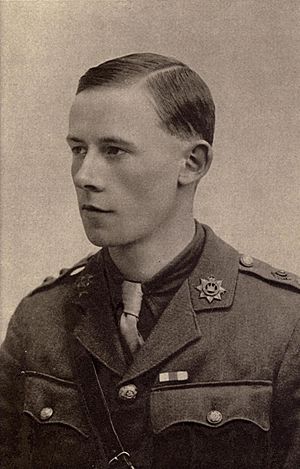W. N. Hodgson facts for kids
Quick facts for kids
W. N. Hodgson
|
|
|---|---|

Hodgson in uniform c. 1915
|
|
| Born |
William Noel Hodgson
3 January 1893 Thornbury, Gloucestershire, England
|
| Died | 1 July 1916 (aged 23) near Mametz, Somme, France
|
| Resting place | Devonshire Cemetery, Picardy, France |
| Nationality | British |
| Education | Durham School |
| Alma mater | Christ Church, Oxford |
| Occupation | Soldier and poet |
| Military career | |
| Allegiance | |
| Service/ |
|
| Years of service | 1914–1916 |
| Rank | Lieutenant |
| Unit | Devonshire Regiment |
| Battles/wars | World War I |
| Awards | Mentioned in Despatches Military Cross |
William Noel Hodgson (born January 3, 1893 – died July 1, 1916) was an English poet and soldier. He is best known for his poems written during the First World War. He sometimes used the pen name Edward Melbourne for his stories and poems.
Contents
Early Life and School Days
William Noel Hodgson was the youngest of four children. His father, Henry Bernard Hodgson, was a bishop. William was born near Bristol, but his family soon moved to Berwick-upon-Tweed.
He started at Durham School in 1905. He earned a special award called a King's Scholarship. William was good at sports. He was part of the rowing team in 1907. He also played on the school's cricket team (XI) in 1910 and 1911. He was on the rugby team (XV) in 1910. He won the Steeplechase race twice, in 1909 and 1911.
In 1911, he left Durham School and went to Oxford University. He studied at Christ Church, Oxford, where he also received a scholarship. He studied classical subjects like Latin and Greek.
Serving in World War I
When the First World War began in 1914, William volunteered to join the British Army. His friends called him "Smiler." He became a soldier in the 9th Battalion of the Devonshire Regiment.
For the first year of the war, he trained in England. In July 1915, he went to France. He was sent to the trenches near Festubert. His first big battle was the Battle of Loos on September 25, 1915.
During this battle, William showed great bravery. He held a captured trench for 36 hours without help or supplies. For his courage, he was given the Military Cross award. He was also promoted to lieutenant.
After the Battle of Loos, William returned to England. In February 1916, his battalion was sent back to the front lines in France. They were near a town called Mametz.
William was killed on July 1, 1916. This was the first day of the Battle of the Somme. He was leading an attack on German trenches. He was shot by a machine gun while carrying grenades to his men. He is buried in the Devonshire Commonwealth War Graves Commission Cemetery.
His Writings and Famous Poem
William started writing poetry in 1913. In 1916, he began publishing stories and poems. He used the pen name Edward Melbourne.
After he died, a collection of his writings was published in 1917. It was called Verse and Prose in Peace and War. This book was very popular and was printed three times.
William is most remembered for his poem 'Before Action'. This poem was published just two days before he died. Many people believe he wrote it knowing he might not survive. The last line of the poem is "Help me to die, O Lord."
"Before Action"
By all the glories of the day
And the cool evening's benison
By that last sunset touch that lay
Upon the hills when day was done,
By beauty lavishly outpoured
And blessings carelessly received,
By all the days that I have lived
Make me a soldier, Lord.
By all of all man's hopes and fears
And all the wonders poets sing,
The laughter of unclouded years,
And every sad and lovely thing;
By the romantic ages stored
With high endeavour that was his,
By all his mad catastrophes
Make me a man, O Lord.
I, that on my familiar hill
Saw with uncomprehending eyes
A hundred of thy sunsets spill
Their fresh and sanguine sacrifice,
Ere the sun swings his noonday sword
Must say good-bye to all of this; –
By all delights that I shall miss,
Help me to die, O Lord.
This poem was written on June 30, 1916, just two days before William died.
More About W. N. Hodgson
You can find more information about William Noel Hodgson and his life in the book:
- Before Action: William Noel Hodgson and the 9th Devons – A Story of the Great War – website
 | Georgia Louise Harris Brown |
 | Julian Abele |
 | Norma Merrick Sklarek |
 | William Sidney Pittman |

